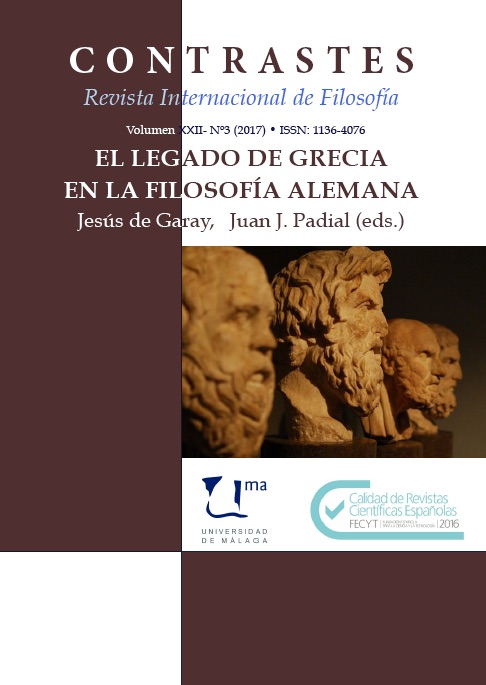La imagen de Grecia en Schiller y Hölderlin: un horizonte utópico siempre por venir
DOI:
https://doi.org/10.24310/Contrastescontrastes.v22i3.3761Keywords:
Grecia, arte, modelo, utopía, ética-políticaAbstract
Resumen
La imagen de la Grecia de Pericles ha sido un ideal de ciudad durante multitud de generaciones. Durante el Romanticismo, autores como Schiller y Hölderlin, entre otros, la concibieron desde una perspectiva filosófica de tal modo que ha configurado hasta cierto punto la imagen que hemos recibido de Grecia. Más allá de ello, y aun reconociendo que se trata de un ideal regulativo de la razón, no deja de ser un modelo filosófico con valores artísticos y éticos-políticos, como su idea de belleza, civismo y cosmopolitismo, que no cesan de interpelarnos en forma de horizonte utópico siempre por venir.
Palabras clave
Grecia; arte; modelo; utopía; ética-política
Abstract
The image of the Greece of Pericles has been an ideal city for many generations. During the Romanticism, authors like Schiller and Hölderlin, among others, conceived it from a philosophical perspective in such a way that it has configured to some extent the image that we have received from Greece. Beyond that, and even admitting that it is a regulative ideal of the reason, it is still a philosophical model with artistic and ethical-political values, as its idea of beauty, civility and cosmopolitanism, which do not cease to question us in the form of utopian horizon always to come.
Keywords
Greece; art; model; utopia; ethical-political
Downloads
Metrics
Publication Facts
Reviewer profiles N/A
Author statements
Indexed in
-
—
- Academic society
- N/A
- Publisher
- Universidad de Málaga
Downloads
Published
How to Cite
Issue
Section
License
This journal provides immediate free access to its content under the principle of making research freely available to the public. All content published in Contrastes. Revista Internacional de Filosofía, are subject to the Creative Commons Attribution-NonCommercial-ShareAlike 4.0 license whose full text can be found at <http://creativecommons.org/licenses/by-nc-sa/4.0>
It is the responsibility of the authors to obtain the necessary permissions of the images that are subject to copyright.
Authors whose contributions are accepted for publication in this journal will retain the non-exclusive right to use their contributions for academic, research and educational purposes, including self-archiving or repository in open access repositories of any kind.
The electronic edition of this magazine is edited by the Editorial Service of the University of Malaga (Uma Editorial), being necessary to cite the origin in any partial or total reproduction.










5.png)
